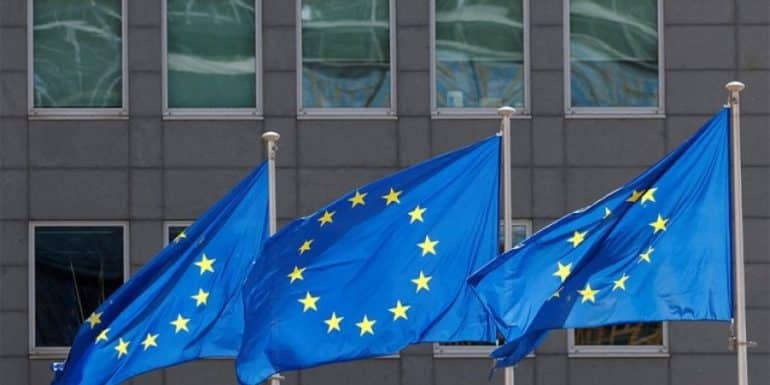One year before the next European Elections, citizens' interest seems to have increased significantly, according to the Parliament's Eurobarometer for spring 2023. The absolute majority of survey respondents (56%) say they are interested in the next European Elections , a percentage higher by 6 points compared to 2018, i.e. one year before the last elections. The corresponding percentage in Greece and Cyprus is 49% in 2023, while in 2018 it was 39% and 50% respectively.
About two in three respondents (67%) say they would probably go to vote if the election were held next week. A similar question was included in Parliament's Eurobarometer in April 2018, and the corresponding figure was then 58%, which shows that citizens are now more willing to vote in the 2024 European Elections than they were at a similar time before 2019 elections. 74% of respondents in Greece and 61% in Cyprus answered positively to the same question.
European Parliament President Roberta Metsola, referring to the results of the survey, said: "Elections matter. Your vote is your chance to fight for the issues you consider important. I call on all citizens, especially young people, to come to the polls and shape the European Union they want to live in."
Elections are a cornerstone of any democratic state and European citizens say that democracy is the most important value that the European Parliament must defend: at the top of the list of values that the Parliament must fight for as a matter of priority is therefore the defense of democracy with 37%, followed by the protection of human rights in the EU and worldwide (28%), as well as freedom of speech and thought (27%). In the same question, democracy is preferred by 41% of respondents in Greece. Solidarity between EU member states and between its regions ranks second with 38% and the rule of law third with 34%. In Cyprus, citizens favor the protection of human rights in the EU and worldwide (43%), with democracy taking second place (33%) and the rule of law third (29%).
54% of respondents (34% in Greece, 56% in Cyprus) say they are satisfied with the way democracy works in the EU. Regarding specific aspects of democracy at EU level, citizens expressed greater satisfaction with free and fair elections (70%), freedom of speech (70%) and respect for fundamental rights (66%), while they were less satisfied with the fight against disinformation and corruption. In Greece, respondents express satisfaction primarily with free and fair elections (63%), followed by media diversity (62%) and freedom of speech (60%), while in Cyprus freedom of speech ranks first (77%), followed by elections (76%) and media diversity (69%). The fight against corruption is in last place, both in Greece and in Cyprus.
Four years after the start of the current legislative period of the European Parliament, citizens recognize the EU's leading role in dealing with the successive crises that have marked this period. European citizens overwhelmingly recognize the impact the EU has on their daily lives: around seven in ten respondents (71%) hold this view. The percentage climbs to 82% for Greece and 87% for Cyprus. A fifth of respondents (18%) say that EU actions have a "very big" impact (39% in Greece, 51% in Cyprus). Citizens also recognize the role of the European Parliament – 62% of respondents say they remember hearing or reading recent references to its work (71% in Cyprus, 59% in Greece).
EU support for Ukraine emerges as the achievement with which citizens express by far the greatest satisfaction: 69% of respondents say they are satisfied with EU actions. The highest percentages are seen in the Netherlands (90%), Sweden (87 %), Finland (87%) and Ireland (87%). Slovakia (45%) and Greece (48%), on the other hand, have the lowest satisfaction rates. In Cyprus the figure is 59%. Respondents also express satisfaction with the EU's action in terms of the protection of democratic rights and respect for the rule of law (64%), as well as in the field of foreign policy (54%). In Greece, the corresponding percentages are 42% and 38%, with the EU Green Agreement scoring a satisfaction rate of 44%. In Cyprus, support for Ukraine and the protection of democratic rights are equal to 59%, with foreign policy scoring 44% and health and consumer protection equaling first place with the EU Green Deal (62% ).
The impact of the multiple crises of recent years is evident, both in the general state of the economy and in the financial situation of citizens. One in two respondents (50%) consider that their standard of living has declined and predict that this will continue over the next year. The percentage climbs to 66% in Greece and 76% in Cyprus. 29% of respondents have not yet noticed something like this, but believe it will happen within the next year (25% and 13% respectively in Greece and Cyprus). This finding raises citizens' expectations for concrete solutions: almost two-thirds (65%) of respondents state that they are not satisfied with the measures taken by their country to deal with the rising cost of living (85% in Greece, 84% in Cyprus), while 57% of respondents are not satisfied with the actions taken by the EU to deal with the situation either (78% and 82% in Greece and Cyprus).
As might be expected, European citizens want the European Parliament to prioritize the fight against poverty and social exclusion (38%). Next in the relevant list of priorities are public health (33%), action against climate change (31%) and supporting the economy and creating new jobs (31%). In Greece, the highest priority for the European Parliament is to support the economy and create new jobs (59%), followed by the fight against poverty and social exclusion (56%) and public health (50%). The picture is different in Cyprus, where public health ranks first (52%), followed by supporting the economy and creating new jobs (49%) and fighting poverty and social exclusion (48%).
Source: RES-EAP
